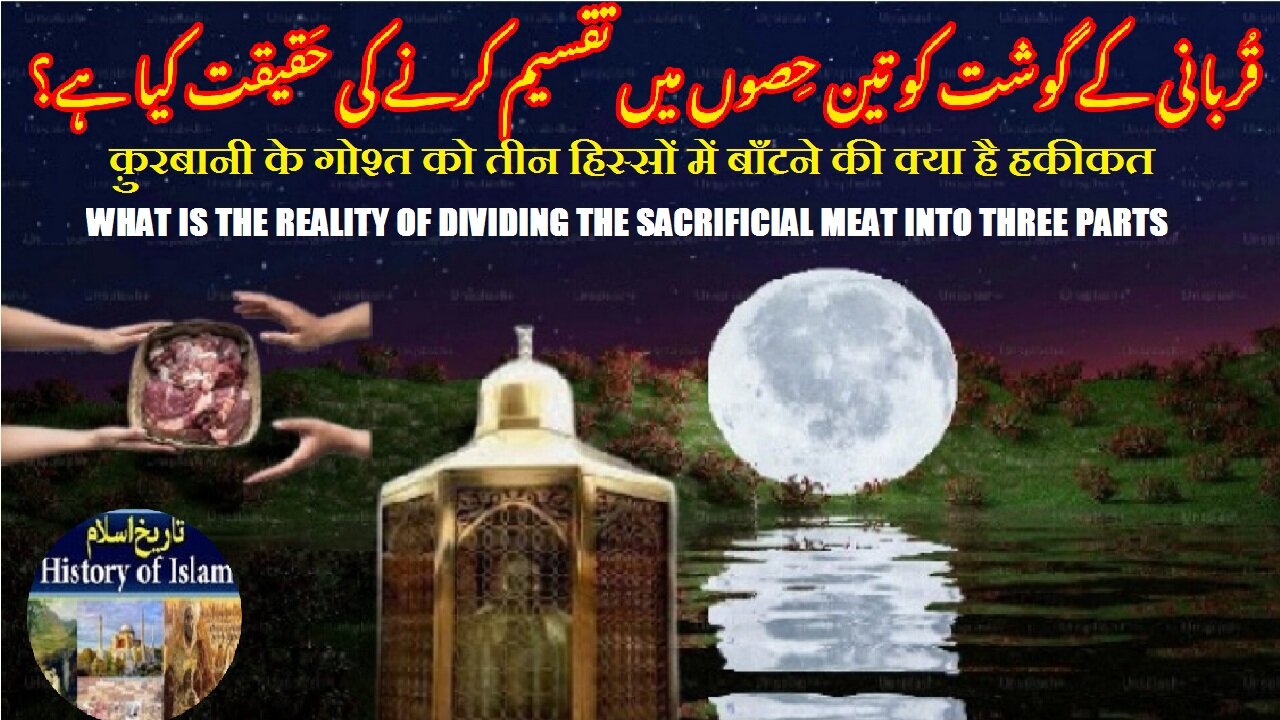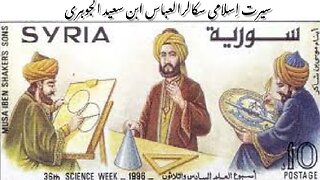Premium Only Content

Reality of dividing meat into three parts قربانی کے گوشت کو تین حصوں میں تقسیم کرنے کی حقیقت
@islamichistory813 #eidaladha2025 #qurbani #meat #islam #sacrifice #eid #sunnah #udhiyah #qurbanimeat #3parts #islamicrule #eidmeat #meatsharing #qurbani2025 #muslimlife #deen
Let me know if you want a matching video description or title in Urdu too.
Would you also like Urdu-language versions or hashtags for this title?
What is the reality of dividing the sacrificial meat into three parts?
Assalamu Alaikum Warahmatullahi Wabarakatuhu. Welcome to our islamic channel, where we describing the beauty of our faith and the wisdom of Islamic teachings, and islamic history. Today, we’ll answer a common question that comes up every Eid al-Adha: *Is it necessary to divide the meat of Qurbani into three parts?* Many of us follow the tradition of dividing the meat into three portions—one for the family, one for relatives and friends, and one for the poor. But is this division an Islamic obligation, or is it simply a recommended practice? Let’s explore the answer with guidance from the Qur’an and Hadith.
First, it’s important to understand the essence of Qurbani. It is a sacred act performed in remembrance of Prophet Ibrahim (A.S.), who was willing to sacrifice his son Isma’il (A.S.) in obedience to Allah’s command. Allah accepted his sincerity and replaced the son with a ram. This legacy is commemorated by Muslims every year through the act of animal sacrifice. But what is the true purpose of this ritual?
The Qur’an answers this question clearly in Surah Al-Hajj, verse 37:
“It is neither their meat nor their blood that reaches Allah, but it is your piety that reaches Him.”
This verse reminds us that the sacrifice is not about the physical act alone, but about the **intention**, the **obedience**, and the **taqwa** behind it. In other words, what matters most is our sincerity, not how we divide the meat.
So where does the idea of dividing the meat into three parts come from? This division is not an obligation. It is a *mustahabb*—a recommended practice—based on the traditions of the Prophet ? and his companions. The scholars of Islam, including the four major schools of thought, agree that it is praiseworthy to divide the meat into three portions: one-third for the family, one-third for friends and relatives, and one-third for the poor. However, this division is not a condition for the sacrifice to be accepted.
Let’s look at another verse in Surah Al-Hajj, verse 28:
**“Then eat from them and feed the needy and the poor.”**
This clearly encourages us to enjoy part of the meat ourselves and to share it with others, especially those in need. However, there is no mention of a required ratio or fixed portions. The emphasis is on generosity, community, and caring for the less fortunate.
In the Hadith, the Prophet Muhammad ? is reported to have eaten from his sacrificial meat and distributed it among the people. Ibn Abbas (RA) said:
**“The Prophet (peace be upon him) used to eat from his sacrificial animal and give some to others.”**
This hadith, found in Musnad Ahmad, highlights the spirit of sharing, but again, it does not mandate a specific division.
Islamic scholars, including Imam Malik, Imam Shafi’i, Imam Ahmad, and even Imam Abu Hanifa, all agree that the division is flexible. A person can choose to keep all the meat, donate all of it, or divide it however they see fit, as long as the **right intention** is there and the meat is not wasted. The only restriction is that the meat should not be sold, and the butcher should not be paid with it.
The wisdom behind the traditional three-part division is rooted in community values. Keeping a portion allows your family to celebrate Eid. Giving to relatives strengthens ties of kinship. And donating to the poor fulfills our duty of compassion and social justice. So while not obligatory, this practice beautifully reflects the values of Islam.
In summary, the division of Qurbani meat into three parts is **not required** by the Qur’an or Hadith. It is a **recommended Sunnah**, inspired by the Prophet’s example and the spirit of sharing. If someone keeps all the meat, the sacrifice is still valid. If someone gives all of it to charity, that is even more commendable. What truly matters is our **taqwa**, our **intention**, and our effort to honor the spirit of Eid al-Adha.
May Allah accept our sacrifices and increase us in sincerity, generosity, and love for His creation. If you found this video helpful, don’t forget to like, share, and subscribe to our islamic channel for more Islamic insights and inspiring content.
Jazakum Allahu Khairan, and Eid Mubarak in advance.
Wassalamu Alaikum Warahmatullahi Wabarakatuhu.
Allah Hafiz
-
 7:53
7:53
ISLAMIC HISTORY
1 day agoBiography of Al-Abbas ibn Said al-Jawhari سیرت العباس بن سعید الجوہری
8 -
 2:11:35
2:11:35
Pop Culture Crisis
3 hours agoElon Declares 'CANCEL NETFLIX' Trump Threatens Hollywood, Bad Bunny Superbowl Boycott? | Ep. 927
9.36K1 -
 3:26:05
3:26:05
Barry Cunningham
4 hours agoPRESIDENT TRUMP IS READY TO GO SCORCHED EARTH! SHUTDOWN DAY 2 BRIEFING!
17.5K20 -
 DVR
DVR
The Trish Regan Show
1 hour ago🚨Trump’s TRIUMPH! DEMS HUMILIATED on LIVE TV as SHUTDOWN BLAME BACKFIRES!
7.4K7 -
 1:39:14
1:39:14
Dr. Drew
6 hours agoFL First Lady Casey DeSantis: Florida Ending ALL Vaccine Mandates, Including For Schools w/ FL Surgeon General Dr. Joseph Ladapo & Tom Renz – Ask Dr. Drew
44.7K5 -
 23:51
23:51
Stephen Gardner
2 hours ago🔥Trump RAGES! Putin’s Plot REVEALED — Bill O’Reilly Breaks His Silence!
11.8K23 -
 1:14:58
1:14:58
vivafrei
6 hours agoHe Was There! Charlie Kirk Assassination Analysis & Conspiracy Debunking w/ Andrew Piskadlo!
74K70 -
 1:05:57
1:05:57
Russell Brand
5 hours agoPfizer Agrees $70 Million Deal With Trump As Study Links Covid Vax to CANCER!! - SF644
108K84 -
 48:25
48:25
JULIE GREEN MINISTRIES
4 hours agoLIVE WITH JULE, ERIC TRUMP AND CLAY CLARK
45K93 -
 1:04:57
1:04:57
The Quartering
6 hours agoTrump Tricks Democrats Again, Cheerleader Monster, Abortion Clinics Shutdown & More
95.2K29
